2020! What a year! Due to the collective trauma that is this pandemic, our lives were completely changed — and so were our lesbian movies. Theatrical releases were either delayed to next year or turned into online exclusives. Netflix thrived, while other studios scrambled.
But the fact is our movies often get this treatment. There are several films on this list that quietly dropped on streaming after successful festival runs, not because of the pandemic, but because that’s all they were ever going to get.
With every passing year more and more of our films get made. And this year the range of films was particularly exciting. We got superhero movies! Teen comedies! Christmas movies! Oscar bait! Musicals!!!! Not everything was great, but isn’t that lovely? Isn’t it lovely to have so many movies that I actually struggled to keep the list to ten instead of struggling to think of ten?
I’m not sure how optimistic I feel about the world, but I feel extremely optimistic about the state of queer cinema!
Films That Didn’t Make the Top Ten with a Short Review:
Ammonite (dir. Francis Lee) — If we were in 2014 this would be the only lesbian film anyone would be talking about and my God am I happy it’s no longer 2014.
Bit (dir. Brad Michael Elmore) — I’m starved for queer trans women on screen like a vampire starves for blood. Is this movie a masterpiece? No. Does it take some questionable turns? Yes. Do I still love it? Absolutely.
Dating Amber (dir. David Freyne) — A classic boy meets girl story where the boy is gay and the girl is also gay. This is a sweet movie, but there are some transphobic lines that stung.
Happiest Season (dir. Clea DuVall) — Look, even if this movie just had Aubrey Plaza, Kristen Stewart’s outfits, and a Jinkx/BenDeLa cameo that’s more than most Christmas movies. You’ve probably already seen this and probably have strong feelings about it but my only strong feeling is I wish my date to watch it hadn’t ghosted.
Kajillionaire (dir. Miranda July) — Miranda July is a unique artist and this is a unique film. It’s ambitious and unpleasant and I’m not sure it entirely works but I really respect what it’s going for. I look forward to revisiting it someday.
A New York Christmas Wedding (dir. Otoja Abit) — If we must compare lesbian Christmas movies, I prefer this one, not because it’s better but because it’s ridiculous in a way I thoroughly enjoyed. To be fair, I was stoned.
The Old Guard (dir. Gina Prince-Bythewood) — Charlize Theron as a world weary millennia old bisexual mercenary who wants to die hit just right for 2020. Her queerness may not be super explicit but it’s there and the movie’s gay male love story is even better. I’ve loved pretty much everything Gina Prince-Bythewood has ever done and this is no exception.
A Secret Love (dir. Chris Bolan) — Why would you make a movie about two old lesbians who met playing baseball and turn it into a story about the homophobic family?? This is by far my least favorite film on this list.
Summerland (dir. Jessica Swale) — This is a perfectly serviceable, uplifting British lesbian period piece led by a strong performance from Gemma Arterton. It could’ve used more time with love interest Gugu Mbatha-Raw, but I was still charmed.
Unpregnant (dir. Rachel Lee Goldenberg) — Queer actress Barbie Ferreira, Haley Lu Richardson, and a stellar ensemble cast elevate this pro-choice road trip romp. (Yes, you read that right.) It’s about the power of friendship! Betty Who plays Ferreira’s monster truck driving love interest! A great way to spend an afternoon!
Yes, God, Yes (dir. Karen Maine) — A charming coming of age movie that mostly focuses on a presumably straight girl but has one really lovely scene with a lesbian! This probably isn’t gay enough to be on this list, but I promise it’s a really lovely scene.
Movie I Loved That’s Directed By a Lesbian But Only Has a Minor Lesbian Character So I’m Calling It an Honorable Mention:
The Last Thing He Wanted (dir. Dee Rees)
Dee Rees is one of the best filmmakers working today, lesbian or otherwise. Pariah? Masterpiece. Mudbound? Masterpiece. Bessie? The best HBO original movie of all time. (Yes, better than Gia.) And then her fourth film dropped on Netflix this year and…. nothing. Why?? Because some mostly white male critics didn’t like it?? The main critique of this Joan Didion adaptation starring Anne Hathaway, Ben Affleck, and Rosie Perez playing a lesbian is that it’s confusing. It’s… not… confusing. I will humor the possibility that I’m just much smarter than Peter Travers, but I have to wonder if what’s really going on is a Black lesbian filmmaker wasn’t given the same benefit of the doubt as the white men who usually make this kind of pointedly convoluted political thriller. This isn’t a perfect film, but it’s thrilling THRILLING to watch Dee Rees’ cinema. She’s a genius and it’s just as exciting to see her reach for new ambitions as it is to watch her masterpieces. I can’t wait for decades more of Dee Rees films!!
The List:
10. Birds of Prey (and the Fantabulous Emancipation of One Harley Quinn) (dir. Cathy Yan)
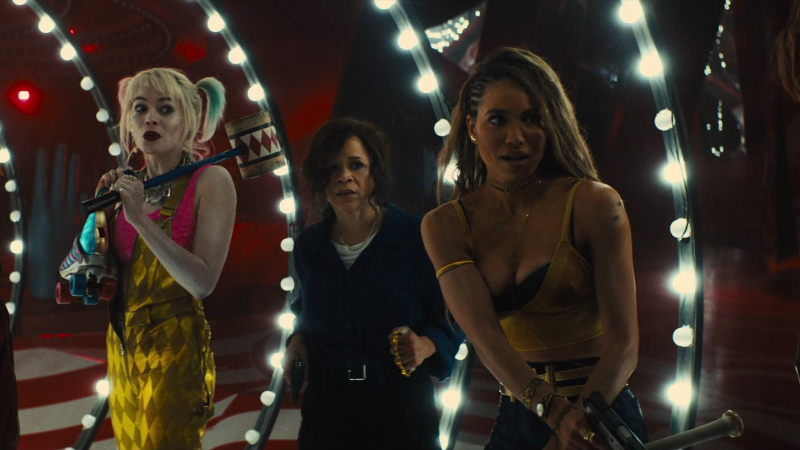
The first canon queer woman superhero movie lead didn’t get a gay love interest. But she did get a breakfast sandwich and isn’t that just as good? Cathy Yan didn’t just give Margot Robbie’s bisexual Harley Quinn the movie she deserves or bring to life Rosie Perez’s lesbian Renee Montoya, she created a big budget action movie that feels queer to its core. Every single character is either explicitly queer or feels coded in some way! This is what I want from a superhero movie: 1) hot women, 2) one liners, 3) every person regardless of gender feels like they’re a drag performer. Well, Birds of Prey delivers. I’m so glad this was the last movie I saw in theatres before the pandemic.
9. Holy Trinity (dir. Molly Hewitt)
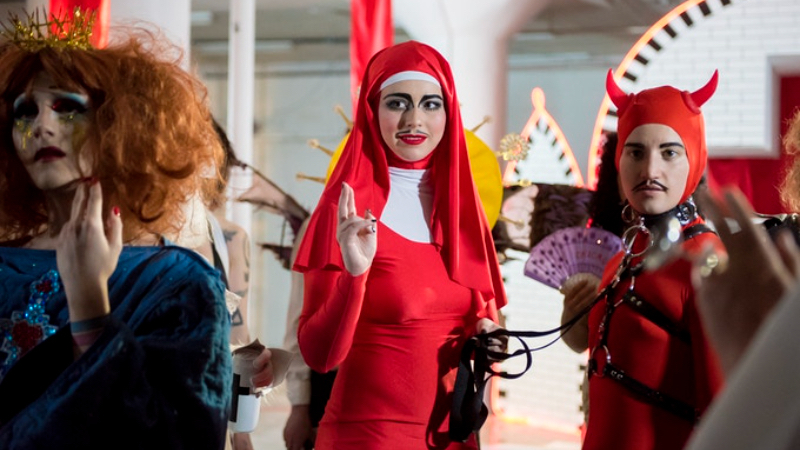
Whenever there’s Twitter discourse about how all queer films are like this or all queer films are like that, it’s clear that people are not seeking out work like writer/director/producer/star Molly Hewitt’s debut feature. All queer films are about a dominatrix who huffs a magic aerosol can and begins communicating with the dead? Nope!! Throw in two nonbinary leads (Hewitt and Work in Progress/The Politician heartthrob Theo Germaine), imaginative low budget production design and costumes, and the setting of Chicago’s queer scene and you get a queer movie that is Q U E E R. It’s funny, it’s sexy, it’s weird, and it’s filled with references and nuance only we’ll understand. Your penance for discourse is ten Hail Mary’s and to rent this movie. You’re welcome.
8. Shakedown (dir. Leilah Weinraub)
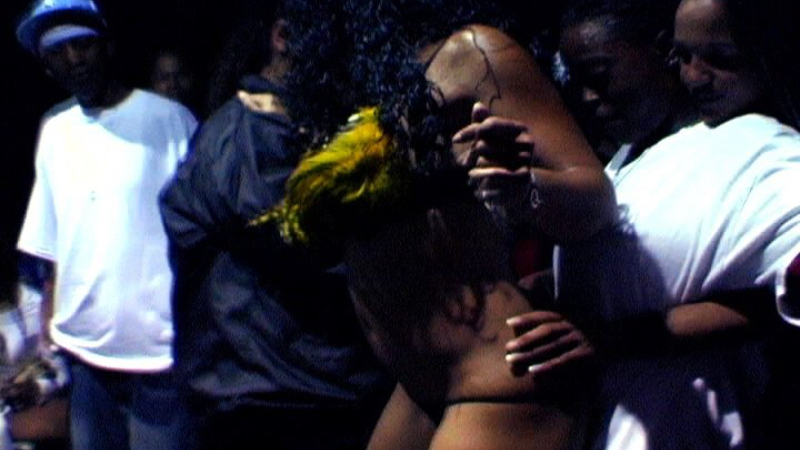
The only film this year to premiere on both PornHub and The Criterion Channel, Leilah Weinraub’s Shakedown is a love letter, a time capsule, and a remarkable work of documentary filmmaking. Weinraub’s camera captures the community Shakedown built — a space for Black queer sexuality — as well as the constant police presence that eventually led to its closure. Weinraub was a frequent patron of the club in the late 90s and early 00s and her affection and closeness to the space is felt in every frame. This film was not made for me, and honestly outside the context of a list like this I wouldn’t write about it, but you should watch the film and then read Bailey’s wonderful review!
7. The Daughters of Fire (dir. Albertina Carri)
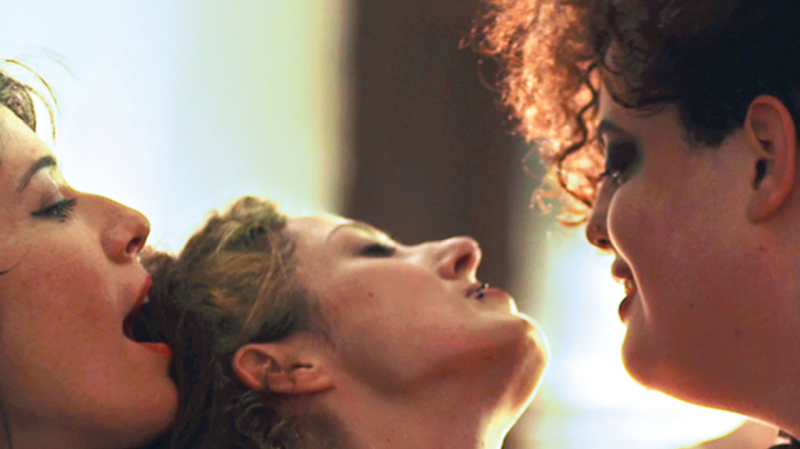
Summer of 2019 (wow remember that?) I saw this movie at Outfest when all my friends were attending the lesbian short film program. Very quickly I knew I’d made the right call. How rare to collectively watch porn nowadays? How rare to collectively watch porn like this ever? When I say I miss movie theatres I specifically mean the feeling of a dozen shocked viewers leaving the theatre and the rest of us collectively experiencing Albertina Carri’s exploration of queer female sexuality and how it’s captured on screen. But even if you didn’t see the film until it premiered on MUBI this year, it’s still an arresting viewing experience that will overwhelm you with its beauty and hotness. Here’s to listening to poetic meditations on gaze before coming.
6. The Prom (dir. Ryan Murphy)
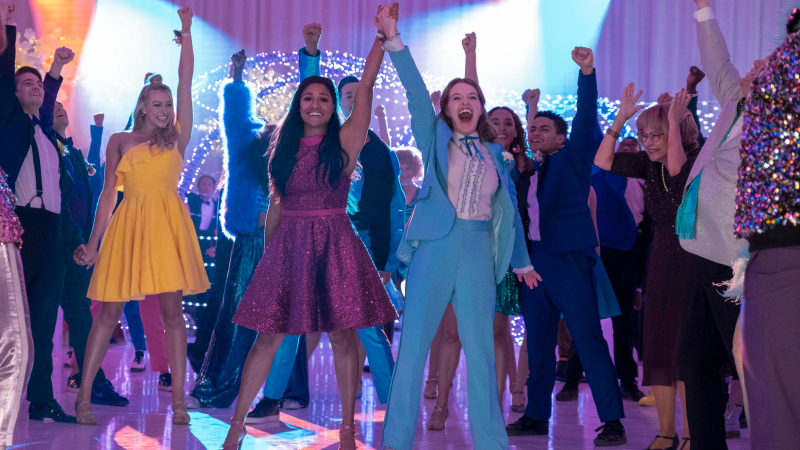
I love musicals. I love Ryan Murphy. I love being gay. And, as established, I love movies where cishet actresses feel like drag queens. I will apologize for none of those things!! I miss theatre so much and watching The Prom reminded of that rare feeling only a Broadway musical can instill. This is the kind of big budget musical adaptation we rarely get these days — and that lesbians have only received once before. This is a queer celebration with some wonderfully absurd over the top performances from people like Meryl Streep and Nicole Kidman and two lovely and grounded performances from queer actors Jo Ellen Pellman and Ariana DeBose. It’s a movie filled with energy and set pieces and silly dance numbers. It’s just very gay in the goofiest, most flamboyant way imaginable. Is the liberal messaging a bit easy? Sure. But I smiled and smiled and smiled and then sobbed and sobbed and sobbed. This was made for all the faggoty Broadway lesbians who didn’t attend their high school prom and I am, in fact, a faggoty Broadway lesbian who did not attend her high school prom.
5. Ma Rainey’s Black Bottom (dir. George C. Wolfe)
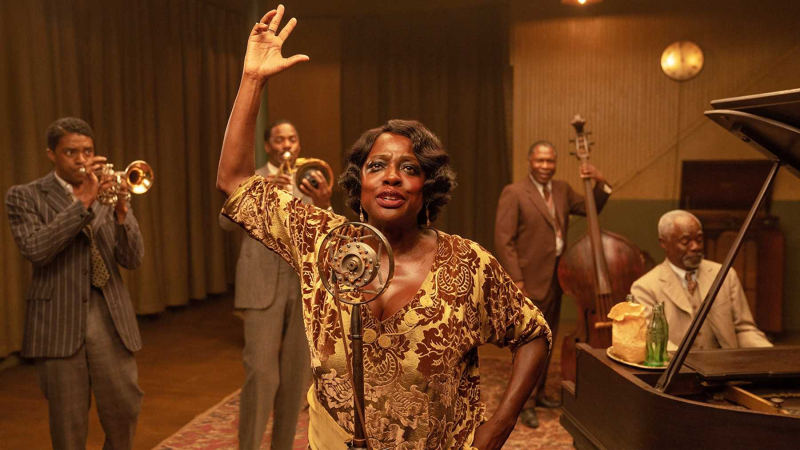
If The Prom reminded me what it was like to see a big Broadway musical, Ma Rainey’s Black Bottom reminded me what it was like to see a masterful straight play — straight only in the non-musical sense. I’ve been lucky enough to see director George C. Wolfe and screenwriter Ruben Santiago-Hudson’s work on stage and this August Wilson adaptation is clearly made by two artists who understand both mediums. Theatre adaptations can sometimes feel stilted, but this film knows when to expand and knows when to stew in its theatricality. This is not a film about queerness per say — its focus is more the creation and appropriation of Black art — but Wolfe, Santiago-Hudson, and greatest actress alive Viola Davis ensure the queerness of the film. There is no subtext. Ma Rainey’s relationship with Dussie Mae played by Taylour Paige is made explicit and her queerness is made an integral part of her character. Lesbian romance films are obviously great, but I think it’s really worth celebrating a film that focuses on a queer woman’s art and how race, gender, and sexuality impact how she creates and moves through the world. This is another film I wouldn’t write about outside the context of a list, but it’s certainly one that I’m grateful to have experienced.
4. La Leyenda Negra (dir. Patricia Vidal Delgado)
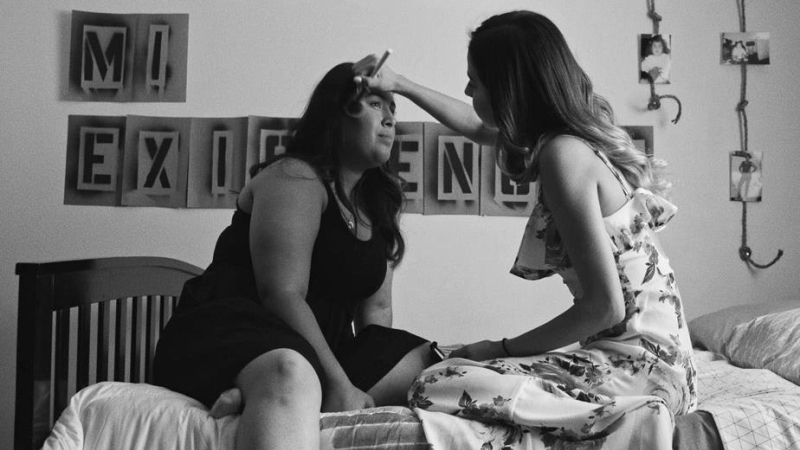
It’s not uncommon for queer films to have a political message. It’s not uncommon for films about any marginalized identity — or intersection of marginalized identities — to have a political message. After all, our very lives are often politicized. But Hollywood’s political queer cinema often manifests in movies like Philadelphia and Freeheld — movies about white people that ignore nuance in favor of empty messages of acceptance. The work ends up feeling less political than your average queer romcom, or even political in a way that’s actively insidious. La Leyenda Negra is an overtly political queer film. It’s an overtly political queer film about immigration with a narrative explicitly responding to Trump ending Temporary Protected Status for 417,000 migrants including 251,000 Salvadoran nationals. We’re informed of these facts in an end title card, but this film isn’t a mere receptacle for information or cheap empathy. First time feature writer/director Patricia Vidal Delgado understands that the most effective political films don’t feel like Political Films — they feel like stories about people. Monica Betancourt gives a phenomenal performance as Aleteia, a teenage girl filled with righteous fury at her circumstances and tender love for her new friend and crush, Rosarito played by Kaileil Lopez. Watching Aleteia and Rosarito find unexpected connection and first queer feelings is a delight. They deserve a world without borders and binaries where they can be free to explore what’s blossoming between them. So much political cinema shouts HEY THIS KIND OF PERSON IS A PERSON TOO, but to even make that statement is an act of dehumanization. Delgado doesn’t need to convince her viewers of anyone’s humanity. She’s just telling a story of two queer Latinx teenagers who deserve better.
3. Second Star on the Right (dir. Ruth Caudeli)
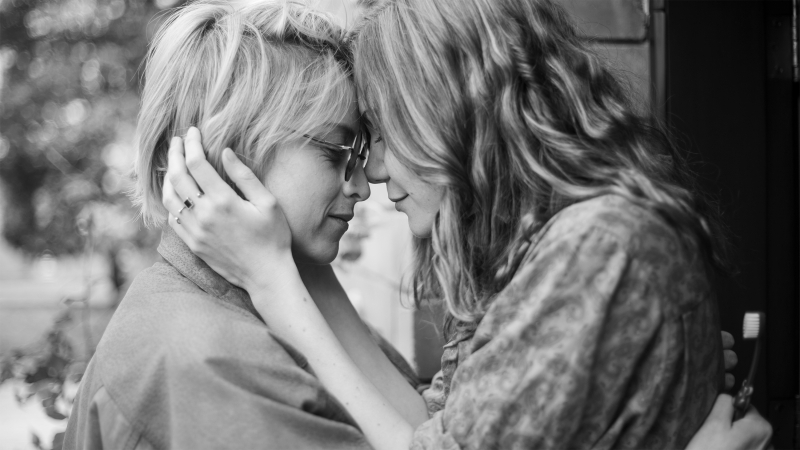
Okay so I’ve reviewed this film, blurbed it for the decade list, blurbed it for the all-time list, and now here I am blurbing it again. And yet almost nobody I know has seen it! That’s probably because it’s only available through Here TV and the Here TV Amazon app. No offense to Here TV, but it’s such a shame one of the very best films I saw during last year’s gay festival circuit is so inaccessible. The good news? You can do a one week free trial and watch the film for free! I know we wish all the best queer films were available on major platforms, but it really doesn’t take that much effort to see Ruth Caudeli’s messy bisexual masterpiece. I want to live in a world where all of queer Twitter is also being traumatized by this character’s bad shame-filled choices!! Co-writer and lead Silvia Varón is such a star and it’s a real joy to spend time in her character’s chaos. This is a wildly inventive film made by queer people, starring queer people, and it’s the exact kind of contemporary-set, slice of life queer woman film everyone claims to be hungry for. So watch it already! I’m tired of repeating myself in blurbs!
2. Alice Júnior (dir. Gil Baroni)
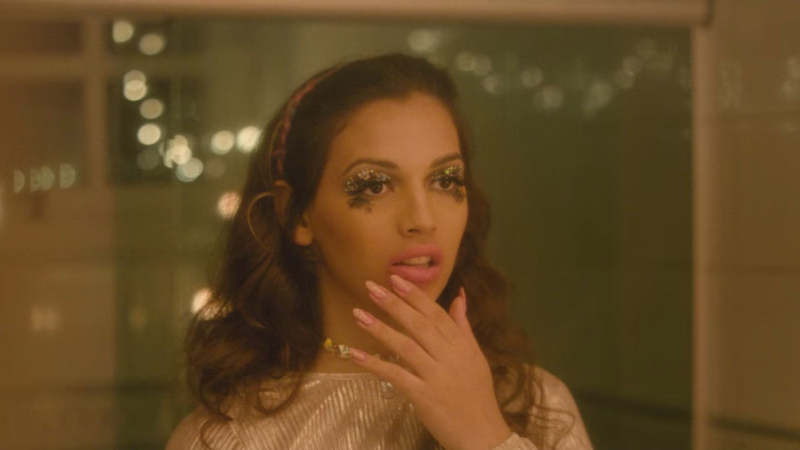
When this first came out I tried to be really delicate about spoilers, because the final twist delighted me into a state I can only describe as a joyous panic attack. But by now you’ve all listened to me and watched it on Netflix, right? Right?? *SPOILERS* Alice is gay! And by gay I mean queer! And by queer I mean who knows! What I do know is Alice is Alice and what a fantastic character I would watch across several more films or an entire TV series. Brought to life by Anne Celestino Mota, Alice is a model/YouTuber with a fabulous Gen Z fashion sense and an equally sharp tongue. She’s everything I wish I could’ve been as a trans teen. She’s fierce yet vulnerable, open-minded yet judgmental when judgement is earned. She’s as committed to her inner sense of justice as she is to fulfilling her romantic fantasies. And while the film focuses on her pursuit of a first kiss with a boy, the fact that her first kiss is instead with a girl is just the loveliest, queerest surprise of the year. The whole cast as friends, as family, as potential lovers all have so much chemistry, and while director Gil Baroni’s style is inventive and screenwriter Luiz Bertazzo’s script is funny and thoughtful, it’s this chemistry that makes the film feel so true. Occasionally a movie or TV show is made that completely elevates my expectations for media about trans people and Alice Júnior is one of those masterpieces. I was asked to guest lecture for a Girl Scout troop of 5th graders and I got to show them a clip from this movie. What a joy to show them this film with an aspirational trans teenager. What a joy that a generation of kids can watch it. What a joy to finally be moving towards the trans media we deserve.
1. The Half of It (dir. Alice Wu)
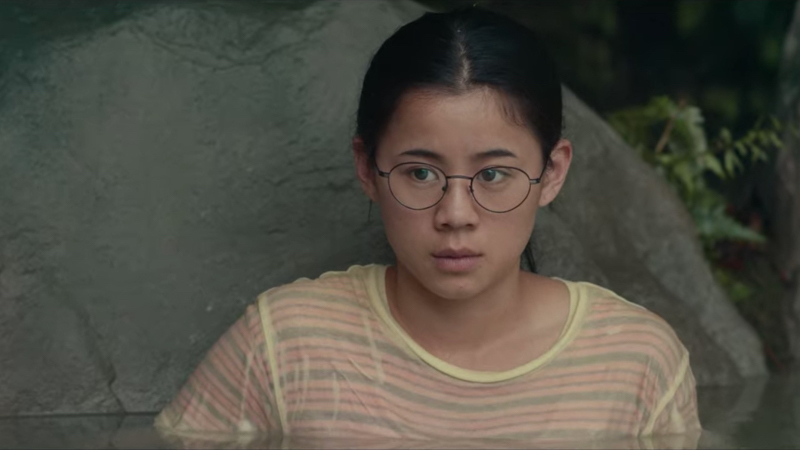
It’s not lost on me that three of the top four movies on this list are coming of age stories. I love this genre because I’m gay and trans and my adolescence was far from the one I wanted. I love this genre because so often the filmmakers are gay and/or trans and/or their adolescence was far from the one they wanted. Queer people have a lot of trauma! And a lot of that trauma goes back to our younger years! Movies provide an escape, a fantasy, a place to process and confront and feel and move on or go deeper or get whatever it is you need on any given day. They can show you a life you had, a life you couldn’t have, a life you want. They can change the ideas we held about our pasts and ourselves and our futures.
When I first heard the Cyrano-esque logline for Alice Wu’s long anticipated second feature, I knew the film would be more than a teen romcom with a hook. After all, her first film, Saving Face, wasn’t your standard adult romcom with a hook. Alice Wu is the kind of artist who waited a decade and a half between projects because she refused to make compromises in this racist, sexist, homophobic industry. She is an artist who stays true to her vision or doesn’t do it all. And what a vision! Saving Face and The Half Of It might be appropriate for kids and straight parents, but in her own way Alice Wu is as punk in her queerness as the most radical artists. The specificity, the nuance, the detail in her craft, these are queer films born from lived experience and brought to life with genius. Their charm, their humor, their approachability do nothing to diminish their quality. Who decided what genres matter most? Who decided what stories matter most? I love queer coming of age movies. I love The Half Of It. This year, it was the story that mattered to me most.
What hidden gems did I miss? What were your favorite queer movies of the year?



Wow, what a wonderful overview. Thank you for doing all the hard work for us and putting this all in one place!
Truly my pleasure!!
If only Wonder Woman 1984 would end up on this list.
PS – +1 Drew
What a list indeed! Kudos + thx! Also: I only watched The half of it 3 times until today….
I rewatched it for the fourth time this weekend too! haha
I loved the film “Carmen y Lola” by Arantxa Echevarría. I watched it on HBO Max.
https://www.youtube.com/watch?v=yqY2LgJ1yHs
Oo I haven’t seen this! Thanks for the rec!
Sure! I really enjoyed it.
Yes! Really good!
Looks like I have some watching to do. Thank you!
Ahhh… Whenever I see The Half of It top a list, I’m reminded of this spot on critique: https://sunkissedproductions.com/blog/2020/5/7/not-even-the-half-of-it
I was also beyond enthused for another Alice Wu film, but felt very let down.
For the T: “Disclosure: Trans Lives On Screen” was a good documentary.
This list follows the same rules as our all time list, so it’s specifically focused on lesbian cinema which isn’t lesbian specifically but an umbrella term encompassing all queer women and nonbinary people interested in women or other nonbinary people. I thought about including Disclosure because some of the work discussed does have trans people who aren’t only into men, buuut since sexuality as an intersection isn’t explicitly discussed I left it off.
I also left off Lingua Franca for the same reason even though I love it a lot and highly recommend it!
The Spanish movie “Camp!” is a musical about two girls at Catholic summer camp. One of them starts having visions of God as a guy who sings her Whitney Houston songs and the other develops feelings for the nun assigned to watch over them. It’s hilarious and over-the-top fantastic campiness.
It’s based on a micro-cast play that debuted in the *lobby* of a major theatre and became a cult hit. 10/10 would recommend.
Oo yes! I know about thus because I’m working on a piece about musicals (and because the writer/directors created Veneno!) but I didn’t realize it wasn’t released in the US until this year! Maybe that’s why I hadn’t heard of it until this piece!
Happy to hear it’s great, because I’m watching it today. And in researching this a lot of potential lesbian musicals were either not queer, not musicals, or just very bad. lololol
This sounds A M A Z I N G
Okay well I’m obsessed with this movie now !!
🙌🏽 🙌🏽 🙌🏽 🙌🏽 it rules
Is the Spanish title La Llamada? (The Call) Have been trying to locate by googling… sounds amazing!
The title and everything is really misleading, because these are only the best movies according to Drew Gregory. This “best of 2020” list is not based on any statistic data or surveys or just general consensus between members of your staff. It’s literally just the opinion of one person. And that is not even mentioned in the article. So how about some clarification?
Lol art is subjective. Even if the entire world somehow collectively agreed that these were the best, that would change next year, or in 5, or 10.
To my mind, a list like this is not meant to stab art through the heart and pin it dead to a collector’s board, but to share the joy (or sometimes frustration) of discovery…to point out bright-burning stars. To say “Do you see the way that one shines?” and to eagerly await responses in the form of shared wonder, or even better, to have someone nudge your vision towards another constellation you had somehow missed.
All of which to say…thank you Drew, for sharing your sense of wonder with us. I really appreciate it! And I can’t wait to watch a range of these I haven’t seen yet! (Ma Rainey’s Black Bottom is coming to Canadian Netflix soon!!!)
Also…Bendela and Jinkxy were by far the best part of The Happiest Season, and since I was a theatre kid who dressed like a drag queen at school, I am apparently going to have to watch The Prom 😆
You are so very welcome. Thank you. :)
Sorry for not making clear what my issue was. I’m well aware that all of these end of year lists are subjective in some way or the other. It’s not about that, it’s not even about Drew’s opinion on the movies. It’s about consent. I as well as other readers get to decide if I want to read something or not. But to make this decision, I would like to be informed what the article is about. If I see an article on a website that I really like and the article’s title says “The Best […] Queer Movies of 2020”, and the indroduction doesn’t explain how this list came to be, I’ll assume it’s at least based on the common consense of autostraddle’s representatives. And I personally am interested to read that then. If I had known that this list is only one person’s opinion, then I would have been less interested and probably wouldn’t have spend the time reading it – or I would, depending on how much that person’s opinion interests me. But how can I make this decision if I don’t know up front (like in the introduction) that it’s not some autostraddle team “best of list” like the title suggests?
The byline was my cue. This one is posted under Drew’s name, while the other 2020 end of year list (“Autostraddle’s Favorite and Least Favorite Lesbian, Bisexual and Trans TV Characters of 2020”) has “The TV Team” as the author.
Please do not appropriate and water down terms like “consent” to refer to frivolous issues like this. You were not irreparably harmed by clicking on a movie article.
THANK YOU
Oh, so consent is only relevant when it comes to harmful things?
Consent is a gravely important concept that needs to be treated seriously because it is already widely misunderstood. So yes, it should be reserved only for issues of significant impact or potential harm. There are two problems with using it the way you have in this context:
1. Watering down the term makes the concept seem less serious. This is not okay and has the potential to harm survivors.
2. Consent cannot work the way you have implied. There is no way for a writer to obtain consent from all of her dozens, hundreds, thousands etc of potential readers for every aspect of her writing. Your perception of the title is not the same as everyone else’s, and there is no way for Drew or the editors to guess what everyone’s individual interpretations are going to be.
Where an issue is widely known to potentially cause serious mental or emotional distress, it can be reasonable to expect a content warning, but there is no such issue in question here.
There are many other ways you can choose to express your opinion here: you can say you think the title is misleading, or you don’t like the way it’s worded, or you’re upset that you spent 20 minutes reading an article you didn’t want to read. But implying that the author or editors somehow violated your consent is a very serious accusation, and not at all appropriate in this context. Please rethink your usage of this term, and if you continue not to understand why this is important, do some research on it.
Thank you so much for this list! I already bookmarked it and I’m really looking forward to watching some of those. Definitely a bright spot this winter :-))
Love this list! Can’t wait to watch. Thanks so much Drew for putting this together.
just here to say i continue to love everything drew writes and she makes me want to watch more movies!! thx drew
I love these year-end lists! In part that’s just because they let me pretend to know what’s going on in film since I don’t really watch movies (the only one of these I’ve seen was the non-listed The Old Guard, and even that was only because I was a fan of the comic) but admitting that in public makes me sound like weirdo. But more than that, I always feel like there’s a happy feeling to “best” lists that doesn’t always make it into other styles of pop culture coverage. So thanks! :)
Chandra, thanks for letting me know your opinion.
I think consent is import in every interpersonal interaction. And while the importance of it varies from situation to situation, applying it to harmless interactions doesn’t “water down” its meaning. I think most people are able to understand that there are situations where it’s less important to ask for someone’s consent or where consent is implied, and situations where it’s absolutely necessary. As self-determined human beings though we should always be given the opportunity to opt out of a situation or interaction. Sometimes we have to give this opportunity to ourselves, like for example ending a fruitless conversation, and sometimes someone else has to give this opportunity to us, like for example asking if they are allowed to kiss or touch us. I’m sorry if anyone only thinks of the term consent in relation to rape/abuse, and not as a concept ingrained in our daily lives and important to all our relationships.
As for my initial ask for clarification on this article, I see it was ignored anyway, so I don’t see any point in further commenting on this matter.
Chandra, again thank you for the discourse, I wish you well, stay safe during the pandemic and happy holidays!
aj answered your question succintly a while back by saying the author name is directly under the title.
Yes, consent applies to more than just sexual assault (note that my wording reflected that fact). But it does not apply to the example you give here, where you are making a tacit decision for yourself, in any of its commonly understood usages or definitions. What you are describing are personal boundaries. And while you may frame those in your mind as things you give yourself consent to do, that is not at all how you used the word in your comment above or how anyone reading it was likely to interpret it.
The idea of watering down the definitions of social justice terms does not come from a vacuum. This is a tactic used by political conservatives, the alt-right, and abusive people, amongst others (I would provide several links, but my comment would get flagged as spam – however, you can do a search for “misuse (or) appropriation of social justice language”, and you will see plenty of examples). It is done intentionally to skew and weaken the impact of those words in their intended contexts.
There is a reason that “consent” is used in serious contexts instead of simply “agreement” or “permission” – it is not a perfect synonym, precisely because it is a word with more weight. Words have the power to influence perceptions, and misusing words in a context where they do not fit in order to get your way is a misuse of that power. You may not have intended it that way, but that is how your comment came across, and why several people were bothered by it.
I hope that clarifies the issue for you. I wish you well also.
Lol. Imagine being this entitled.
My favorite lesbian holiday movies are directed by Christin Baker, ‘I Hate New Years’ and ‘Season of Love’. If you haven’t seen them, they are both worth watching and available on Tellofilms.com.
yes, yes, yes for alice wu & the half of it! “she doesn’t settle in this racist, sexist, homophobic industry”!!!!! as a closeted asian living in a conservative city, couldn’t agree more! when i watched the half of it for the first time, i watched it for my fifth and sixth time in the same day!!
But but but what about Portrait of a lady on fire?
2019 release, even though most of us saw it in 2020
Just watched Alice Júnior on Netflix and it was the best decision ever. So delightful! Thank you for this list!
I think your list sucks. Also I often wish it was 2014. It greatly saddens me that people like you have a voice, and that people actually listen to it. Your list isn’t very inclusive, and only represents those like you. I hope people give some of the movies that didn’t make the list a chance. Be your own person make opinions for yourself. Please….please….please do not take this asshats opinion as truth.